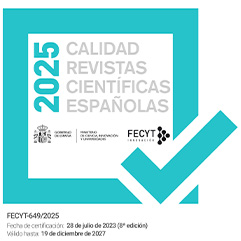El papel de la cultura en la evaluación de la felicidad entre países. Una aproximación fsQCA
DOI:
https://doi.org/10.17561/ree.n2.2022.7121Palabras clave:
felicidad, cultura, rankings de paises, fsQCAResumen
La felicidad de los países tiene importantes efectos en la imagen, prestigio, captación de
fondos o turismo de los mismos y se elaboran rakings y modelos que intentan explicar de
qué depende la misma. En este trabajo se explora la posibilidad de mejorar el modelo del
World Happiness Report mediante dos vías: la inclusión de variables culturales y el análisis de
posibles interacciones entre las variables. Para ello, se ha completado la base de datos original
con las dimensiones culturales del conocido modelo de Hofstede, replicando los análisis de
regresión originales y utilizando un analisis fsQCA. Los resultados muestran la necesidad de
incluir la cultura en este tipo de estudios y la existencia de tres modelos diferentes de países con
altas puntuaciones en felicidad.
Descargas
Referencias
Barbosa, B. (2017). Happiness in marketing. In: Ripoll, R.R. (Ed.), Entornos creativos, empleados felices: Una ventaja competitiva en la gestión empresarial y territorial. Uno Editorial, Albacete, Spain. 75–90.
Blanchflower, D. & Oswald, A. (2008). Is well-being U-shaped over the life cycle? Social Science & Medicine. (66). 1733–1749. DOI: https://doi.org/10.1016/j.socscimed.2008.01.030
Bettingen, J. & Luedike, M. (2009). Can Brands Make Us Happy? A Research Framework for the Study of Brands and Their Effects on Happiness. Advances in Consumer Research. (36). 308-315.
Brickman, P. & Campbell, D. (1971). Hedonic relativism and planning the good society, in M. H. Apley (ed.), Adaptation-level Theory: A Symposium. New York: Academic Press. 287-302.
Cavalletti, B y Corsi, M. (2018). ‘‘Beyond PIB’’ Effects on National Subjective Well-Being of OECD Countries, Social Indicators Research (136). 931–966. DOI: https://doi.org/10.1007/s11205-016-1477-0
Cantril, H. (1965). Pattern of Human Concerns. New Jersey: Rutgers University.
De Neve, J; Ed, Diener; Louis, Tay. & Cody, Xuereb. (2013). The objective benefits of subjective well-being. In J. Helliwell, R. Layard, and J. Sachs (eds), World happiness report.
De Neve, J. & Oswald, A. (2012) Estimating the influence of life satisfaction and positive affect on later income using sibling fixed effects. Proceedings of the National Academy of Sciences (109). 49. DOI: https://doi.org/10.1073/pnas.1211437109
Diener, E., & Tov, W. (2012). National Accounts of Well-being. In K. C. Land, M. Sirgy, & A. C. Michalos (Eds.), Handbook of social indicators and quality of life research. 137–157). Dordrecht: Springer. DOI: https://doi.org/10.1007/978-94-007-2421-1_7
Fafchamps, M. & Shilpi, F. (2008). Subjective welfare, isolation, and relative consumption. Journal of Development Economics. (86)(1., 43–60. DOI: https://doi.org/10.1016/j.jdeveco.2007.08.004
Fiss, P. (2011). Building better causal theories: A fuzzy set approach to typologies in organization research. The Academy of Management Journal (54) 2. 393-420. DOI: https://doi.org/10.5465/amj.2011.60263120
Frey, B. & Stutzer, A. (2005). Happiness research: State and prospects. Review of Social Economy 62(190), 207–228. DOI: https://doi.org/10.1080/00346760500130366
Fromm, E. (1976). To Have or to Be? New York: Harper & Row.
Gough, I., & McGregor, J. (Eds.). (2007). Wellbeing in Developing Countries: From Theory to Research. Cambridge: Cambridge University Press. DOI: 10.1017/CBO9780511488986
Graham, C; Eggers, A. & Sukhtankar, S. (2004) Does happiness pay? An exploration based on panel data from Russia. Journal of Economic Behavior & Organization. (55). 319–342. DOI: https://doi.org/10.1016/j.jebo.2003.09.002
Graham, C. & Pettinato, S. (2002). Happiness and hardship: opportunity and insecurity in new market economies. The Brookings Institution Press, Washington DC.
Headey, B; Muffels, R. & Wooden, M. (2008). Money does not buy happiness: or does it? A reassessment based on the combined effects of wealth, income and consumption. Social Indicators Research. (87)(1). 65–82. DOI: https://doi.org/10.1007/s11205-007-9146-y
Helliwell, J; Layard, R. & Sachs, J. (2019). World Happiness Report 2018. New York: Sustainable Development Solutions Network.
Hofstede, G. (1980). Culture's Consequences, International Differences in Work-Related Values, SAGE publications: Newbury Park etc.
Hofstede, G. (2001). Culture’s Consequences: Comparing Values, Behaviors, Institutions, and Organizations Across Nations, 2nd Ed., SAGE publications, Thousand Oaks etc.
Hofstede, G. (2005). Cultures and Organizations: Software of the Mind, 2nd Ed., McGraw Hill: New York.
Hsieh, W & Yang, B. (2015). The pursuit of happiness: An empirical study of BLI of OECD countries, IEEE International Conference on Orange Technologies. (ICOT, DOI: 10.1109/ICOT.2015.7498481. DOI: https://doi.org/10.1109/ICOT.2015.7498481
Hwang, J. & Han, H. (2014). Examining strategies for maximizing and utilizing brand prestige in the luxury cruise industry. Tourism Management. (40). 244–259. DOI: https://doi.org/10.1016/j.tourman.2013.06.007
Jorm, A. & Ryan, S. (2014). Cross-national and historical differences in subjective well-being. International Journal of Epidemiology. (43)(2). 330–340. DOI: https://doi.org/10.1093/ije/dyt188
Kahneman, D; Krueger, A; Schkade, D; Schwarz, N. & Stone, A. (2004). Toward national well-being accounts. American Economic Review, (94). 429–434. DOI: https://doi.org/10.1257/0002828041301713
Kruger, S. (2018). Soul searching on the wings of my wheels: motorcyclists’ happiness. Journal of Psychology in Africa. (28)(3). 218–223. DOI: https://doi.org/10.1080/14330237.2018.1475912
Kumar, A; Paul, J. & Starčević, S. (2021). Do brands make consumers happy? - A masstige theory perspective. Journal of Retailing and Consumer Services. (58). 102318. DOI: https://doi.org/10.1016/j.jretconser.2020.102318
Labroo, A. & Patrick, V. (2009). Psychological distancing: why happiness helps you see the big picture. Journal of Consumer Research. (35)(5). 800–809. DOI: https://doi.org/10.1086/593683
Layard & Richard (2005). Happiness: Lessons from a New Science (New York: Penguin Press).
Loureiro, S. & Cunha, N. (2017). Wine prestige and experience in enhancing relationship quality and outcomes. International Journal of Wine Business Research. (29)(4). 434–456. https:// doi.org/10.1108/IJWBR-04-2017-0033
Lu, L. & Gilmour, R. (2004). Culture and conceptions of happiness: Individual oriented and social oriented SWB, Journal of Happiness Studies. (5). 265-291. DOI: https://doi.org/10.1007/s10902-004-8789-5
Noll, H. & Weick, S. (2015). Consumption expenditures and subjective well-being: empirical evidence from Germany. International Review of Economics. (62)(2). 101–119. DOI:https://doi.org/10.1007/s12232-014-0219-3
Pappas, I. & Woodside, A. (2021). Fuzzy-set Qualitative Comparative Analysis (fsQCA): Guidelines for research practice in Information Systems and marketing. International Journal of Information Management. (58). DOI: https://doi.org/10.1016/j.ijinfomgt.2021.102310
Paul, J. (2019). Masstige model and measure for brand management. European management journal. (37)(3). 299–312. DOI: https://doi.org/10.1016/j.emj.2018.07.003
Peters, M; Flink, I; Boersma, K & Linton, S; (2010). Manipulating optimism: can imagining the best possible self be used to increase positive future expectancies? Journal of Positive Psychology. (5)(3). 204–211. DOI: https://doi.org/10.1080/17439761003790963
Ragin, C. (2008). Redesigning Social Inquiry: Fuzzy Sets and Beyond (Illustrated ed.). University of Chicago Press. DOI: https://doi.org/10.7208/chicago/9780226702797.001.0001
Schmitt, B; Brakus, J. & Zarantonello, L. (2014). The current state and future of brand experience. Journal of Brand Management. (21)(9). 727–733. DOI: https://doi.org/10.1057/bm.2014.34
Schnebelen, S. & Bruhn, M. (2018). An appraisal framework of the determinants and consequences of brand happiness. Psychology & Marketing. (35)(2). 101–119. DOI:https://doi.org/10.1002/mar.21073.
Stanca, L. & Veenhoven, R. (2015). Consumption and happiness: an introduction. International Review of Economics. (62)(2). 91–99. DOI: https://doi.org/10.1007/s12232-015-0236-x
Steptoe, A; Deaton, A. & Stone, A. (2015). Subjective well-being, health, and aging. Lancet. (385). 640–48. DOI: https://doi.org/10.1016/S0140-6736(13)61489-0
Tonikyan, M. & Stepanyan, L. (2018). The population’s happiness and safety as predictors of the country’s economic development. Modern Psychology, nº 2. DOI: https://doi.org/10.46991/SBMP/2018.1.2.131
Tiberius, V. (2004). Cultural differences and philosophical accounts of wellbeing, Journal of Happiness Studies (5). 293–314. DOI: https://doi.org/10.1007/s10902-004-8791-y
Uchida, Y; Norasakkunkit V. & Kitayama S. (2004). Cultural constructions of happiness: Theory and empirical evidence, Journal of Happiness Studies. (5). 223–239. DOI: https://doi.org/10.1007/s10902-004-8785-9
Van, B. (2005). Experientialism, materialism, and the pursuit of happiness. Review General of Psychology. (9)(2). 132–142. DOI: https://doi.org/10.1037/1089-2680.9.2.132
Wang, H; Cheng, Z. & Smyth, R. (2019). Consumption and happiness. The journal of Development Studies. (55)(1). 120–136. DOI: https://doi.org/10.1080/00220388.2017.1371294
Welsch, H. (2007). Environmental welfare analysis: A life satisfaction approach. Ecological Economics. (62). 544–551. DOI: https://doi.org/10.1016/j.ecolecon.2006.07.017
Zhang, J. & Xiong, Y. (2015). Effects of multifaceted consumption on happiness in life: a case study in Japan based on an integrated approach. International Review of Economics. (62)(2). 143–162. DOI: https://doi.org/10.1007/s12232-015-0225-0
Descargas
Publicado
Número
Sección
Licencia
Derechos de autor 2022 Universidad de Jaén

Esta obra está bajo una licencia internacional Creative Commons Atribución 4.0.
- Los autores/as conservarán sus derechos de autor y garantizarán a la revista el derecho de primera publicación de su obra, el cuál estará simultáneamente sujeto a la Licencia de reconocimiento de Creative Commons que permite a terceros compartir la obra siempre que se indique su autor y su primera publicación esta revista.
- Los autores/as podrán adoptar otros acuerdos de licencia no exclusiva de distribución de la versión de la obra publicada (p. ej.: depositarla en un archivo telemático institucional o publicarla en un volumen monográfico) siempre que se indique la publicación inicial en esta revista.
- Se permite y recomienda a los autores/as difundir su obra a través de Internet (p. ej.: en archivos telemáticos institucionales o en su página web) antes y durante el proceso de envío, lo cual puede producir intercambios interesantes y aumentar las citas de la obra publicada. (Véase El efecto del acceso abierto).
La Revista de Estudios Empresariales. Segunda Época, utiliza PKP Preservation Network (PN).




























